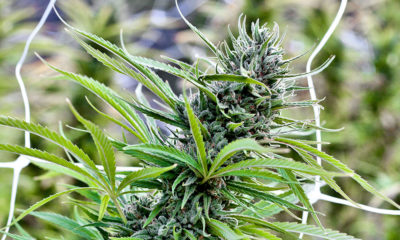
Cannabis
Canopy Taxes: When Cannabis Growers Are Taxed For Ruined Crops
Many municipalities looking to capitalize on the cannabis industry have considered or passed “canopy taxes,” which levy taxes on cannabis growers up front for their crops — no matter what happens to the plants before harvest and sale.
October’s Northern California wildfires, the worst in state history by a wide margin, killed more than 40 people and destroyed more than 5,000 homes. The fires also wiped out as much as $60 million worth of the state’s annual marijuana harvest, according to an estimate from the California Growers Association, a statewide pot farmers’ lobby.
Very little of the damage to cannabis farmers’ homes and livelihoods — if any — will be made whole by insurance or disaster relief funding. Risk-averse insurance agencies have chosen to steer clear of the marijuana industry, and federal money made available to fire victims won’t be extended to stewards of federally illegal crops like cannabis.
However, cannabis farmers may still owe taxes, even on crops turned to ash before they ever reached the market.
Wildfires are a way of life in California — which, at an estimated 13.5 million pounds grown in 2016, is also the country’s biggest producer of marijuana. Wildfires burnt out cannabis growers in Calaveras County in 2015, and wildfires struck Humboldt County, in the state’s legendary Emerald Triangle, in 2008. As wildfires of the type that burned Sonoma and Napa counties earlier this year become more likely and more severe thanks to climate change, the likelihood that another fire will strike a marijuana-growing region is near-certain.
But as the Nevada County, California-based newspaper The Union is reporting, local and state authorities may still stick growers burnt out by wildfires with cultivation tax bills.
In addition to a 15 percent excise tax and a $9.25 per ounce cultivation tax levied by the state, Nevada City is proposing a tax ranging from $1 to $4 per square foot on marijuana grows, a so-called “canopy tax.” Canopy taxes are proving popular among cities and counties around the state looking to use marijuana cultivation to grow their budgets — but, as marijuana advocates point out, they can place an unfair burden on growers, who will owe taxes even if they don’t record any earnings.
“How fair is it to tax something you’re not even being compensated for?” asked Jonathan Collier.
Collier, who sits on the executive committee of the Nevada County Cannabis Alliance, told The Union, “[T]he whole model is flawed.”
It’s unclear how many cannabis grows are currently operating inside the limits of Nevada City — a small, quaint town in the foothills popular with artists and urban expatriates for its bucolic setting and well-preserved Gold Rush-era buildings. The problem, Collier told the newspaper, would be other counties or cities with robust cultivation industries following suit and passing their own version of a cultivation tax that would be due regardless of what happened to the crops.
Much fairer and more reasonable, Collier says, is a tax based on gross receipts or sales. Or an exemption, perhaps, in the case of fire, flood, theft, or other disaster beyond a grower’s ken.
So far, the trend is not in towards a grower-friendly direction. In fall 2016, a year after marijuana operations in Calaveras County burned, politicians put before voters a tax proposal that would have charged burnt-out farms $2 per square foot for the privilege. The tax didn’t pass, but it appears law and policy makers have a formula for squeezing money out of cannabis growers in mind — and it guarantees a cash flow towards government regardless of whether the growers are generating revenue.
TELL US, what do you think about canopy taxes?





















